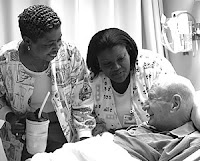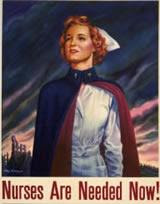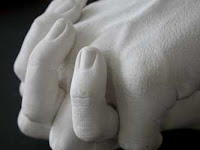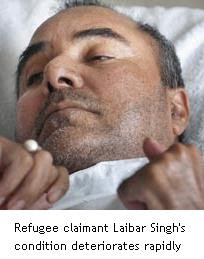Liberal Leader Stephen McNeil's remonstrations in the legislature this month condemning a year-old memo from some Capital District Health Authority physicians proposing a new, doctor-driven, private-public, "Mayo Clinic-like" hospital facility in metro were an emblematic example of the sort of backward, stick-in-the-mud attitudes and reactionary, tunnel-vision thinking that keep Nova Scotia an underachieving backwater.
McNeil trotted out the customary boilerplate about defending the sacrosanct public health care system from the evils of profit motive or market accountability, trotting out the old FUD (Fear, Uncertainty and Doubt) about privatization of health care delivery leading to (horrors!) - two-tiered health care, with NDP leader Darrell Dexter chiming in with his labour-union constituency's pet trope about private hospitals and clinics supposedly luring doctors and nurses away from the public system.
The 2006 memo, reportedly authored and signed by Capital Health surgeon Robert Stone, lays out a concept for clinics or centres that "should not be staffed by 'unionized' personnel
It would focus on providing endoscopy; breast health services; prostate therapy; various other diagnostics; orthopedic surgery, other same-day surgeries, and executive preventive health - all procedures that do not require the facilities of a fully-equipped and staffed, acute-care surgical hospital.
For which there is a strong demand that isn't being met in a timely fashion by the current public system, and which helps keep waiting lists long for other, more complex surgeries and treatments.
It's just, plain inefficient and a misuse of scarce resources.
Read the full story here
Monday, January 7, 2008
Does Halifax get its own Mayo Clinic?
Posted by
Guy Derla
at
7:56 AM
0
comments
![]()
Tags: Canadian health care system, Capital District Health Authority, clinics, Doctor, Halifax, Mayo Clinic, NDP, Nova Scotia, nurses, physicians, private clinic, private hospital, public health care system
Monday, December 31, 2007
Children's Hospital in London, Ont., to recruit 4 new heart doctors
 An all-out effort will be made in 2008 to recruit at least three new children’s heart doctors to London, the head of the city’s hospitals said.
An all-out effort will be made in 2008 to recruit at least three new children’s heart doctors to London, the head of the city’s hospitals said.
“It is very, very important to me to sustain Children’s Hospital and therefore we are going to devote a lot of time and energy to try and make this happen,” said Cliff Nordal, president of both London Health Sciences Centre and St. Joseph’s Health Care.
Both of London’s children’s heart doctors, Dr. Dion Pepelassis and Dr. Ilan Buffo, have resigned to accept positions at Winnipeg Children’s Hospital at the end of June.
"London needs a minimum of three of the specialists to provide a sustainable service and will try to hire four by the end of 2008, " Nordal said.
“We will be looking as well at international medical graduates that are in training in Canada.”
Nordal called the loss of the two children’s heart specialists “a blip” in an otherwise successful drive to recruit health care professionals to London.
Faced with the closure of hospital beds because of a lack of nurses, London Health Sciences Centre set a target last February to hire 450 new nurses.
To date, the hospital has recruited about 340, allowing it to reopen all of the closed beds.
“We expect by the end of March we will reach our target,” Nordal said.
The closed beds contributed to extended waits for patients in the city’s emergency departments and led to the cancellation of some surgeries.
"Not all the problems will be solved with the beds reopened," Nordal said.
The hospital still has difficulties providing enough beds for acute care because 40 to 70 beds are occupied by people waiting for placement in long-term care facilities or back into the community.
The Ontario government announced it will expand the number of long-term care beds in the London area by 600, but those beds won’t be available until late 2010.
St. Joseph’s Health Care has proposed to the Health Ministry that it opens 50 beds at the Parkwood Hospital site, at least on a temporary basis, to reduce the pressure.
“That has not been approved yet, but we are hopeful that that will be considered as at least an interim step,” Nordal said.
Another challenge that will persist in the face of rising cancer rates is the wait times for cancer scans and therapies.
In the past year, the number of people receiving cancer therapy treatments at LHSC grew by 15 percent.
“It is just a burgeoning amount of care required. It spills over into surgery, it spills over into imaging and as a result those are the areas we are having our greatest wait list challenges.”
“Those will be areas we will try to tackle in the coming year, trying to get down to the provincial average where possible,” Nordal said.
Source: The London Free Press
Related article:
Two children's heart doctors for Winnipeg Regional
Posted by
Guy Derla
at
1:06 PM
0
comments
![]()
Tags: cardiac, government, heart surgery, hospital, London Children's Hospital, London Health Sciences Centre, nurses, nursing, nursing shortage, Ontario, registered nurse, Winnipeg
Saturday, December 29, 2007
Medical Honey back in the health care game
 Amid growing concern over drug-resistant super bugs and non-healing wounds that endanger diabetes patients, nature's original antibiotic honey, is making a comeback.
Amid growing concern over drug-resistant super bugs and non-healing wounds that endanger diabetes patients, nature's original antibiotic honey, is making a comeback.More than 4,000 years after Egyptians began applying honey to wounds, Derma Sciences Inc., a New Jersey based American company with branches in China and Toronto, that makes medicated and other advanced wound care products, began selling the first honey-based dressing this fall after it was approved by the U.S. Food and Drug Administration.
It is called Medihoney, it's made from a highly absorbent seaweed-based material, saturated with Manuka honey, a particularly potent type that experts say kills germs and speeds healing.
Also called Leptospermum honey, Manuka honey comes from hives of bees that collect nectar from manuka and jelly bushes in Australia and New Zealand.
Derma Sciences now sells two Medihoney dressings to hospitals, clinics and doctors in North and South America under a deal with supplier Comvita LP of New Zealand.Derma Sciences hopes to have its dressings in U.S. and Canadian drug stores in the next six months, followed by adhesive strips.
Comvita, which controls about 75 percent of the world's Manuka honey supply, sells similar products under its own name in Australia, New Zealand and Europe, where such products have been popular for over a decade.
"The reason that Medihoney is so exciting is that antibiotics are becoming ineffective at fighting pathogens," said Derma Sciences CEO Ed Quilty.
"Another big advantage is that the dressings' germ-fighting and fluid-absorbing effects last up to a week, making them convenient for patients being cared for at outpatient clinics or by visiting nurses."
"They also reduce inflammation and can eliminate the foul odors of infected wounds," he said.
Honey dressings and gels, as well as tubes of Manuka honey, have been gaining in popularity overseas, fueled by scientific reports on their medical benefits and occasional news accounts of the dramatic recovery of a patient with a longtime wound that suddenly healed.
Read the rest of the article here
Posted by
Guy Derla
at
10:25 PM
0
comments
![]()
Tags: Australia, Canada, clinics, Europe, germs, healing process, infected wounds, Leptospermum honey, Manuka honey, medical honey, Medihoney, New Zealand, nurses, seaweed, Toronto, U.S.
Canada recruits hundreds of Practical Nurses from Jamaica
 Hundreds of Jamaicans were recruited in October to work in health care, the construction and hospitality service sectors in British Columbia through the Ministry's Canadian Overseas Employment Programme.
Hundreds of Jamaicans were recruited in October to work in health care, the construction and hospitality service sectors in British Columbia through the Ministry's Canadian Overseas Employment Programme.The group included mainly certified practical nurses, but also a group of pipe-fitters, welders, and carpenters.
Over the years, Jamaicans have been recruited to work in Ontario, Montreal, Quebec and New Brunswick on the Overseas Farm Work Programme but this is the first time that employees are being requested for the health care, hospitality and construction sectors.
Canada will be recruiting approximately 2,000 practical nurses by the end of 2008.
As part of the recruitment programme, there is a partnership between the Okanagan College and the HEART/NTA, to ensure the certification of workers so that they will be ready to go directly into the workforce once they arrive in Canada.
Source: JIS
Posted by
Guy Derla
at
9:55 PM
0
comments
![]()
Tags: British Columbia, Canada, Canadian Overseas Employment Programme, certification, health care, Jamaica, LPN, Montreal, New Brunswick, nurses, nursing, nursing shortage, Ontario, Quebec, recruiting
Sunday, December 23, 2007
Calgary Health Region huge deficit due to nearly 1 million hours overtime

The Calgary Health Region will post a sizable deficit this year as staffing shortages leave the medical authority with a massive bill for nearly one million hours in overtime, says the region's chief executive.
Despite earlier predictions of a balanced budget, Jack Davis, CEO of the Calgary Health Region, said the CHR will sink into the red in the '07-'08 fiscal year, due to a larger-than-expected pay hike for nurses and $63 million in overtime costs.
Davis would not reveal the anticipated size of the deficit facing the CHR, the body in charge of Calgary's health system including four hospitals. He said it will be larger than last year's $70-million shortfall, which required a government bailout.
"There's no question we'll have a deficit," Davis said in a year-end interview with the Herald.
"It's definitely going to be harder than last year."
The health authority has faced persistent problems finding enough nursing staff in recent years, which has forced local hospitals to close beds and cancel procedures.
Earlier this month, the Alberta Children's Hospital had to reschedule six surgeries in two weeks because there were not enough critical care nurses.
The CHR has faced ongoing financial pressures, largely because of Calgary's booming population and increasingly expensive medical technology.
The cash-strapped region has posted several deficits in recent years, including a $70-million shortfall last year and a $58-million deficit in 2004-05.
This year, shortages of nurses and other health workers have placed a new strain on the region's budget: overtime costs have climbed from $43.5 million last year to $63 million this year.
CHR is also picking up its share of the tab for a new contract the government signed with the province's registered nurses.
The deal, which makes Alberta's nurses the highest paid in Canada, came in higher than the CHR anticipated, leaving the region with a
$13-million unbudgeted expense.
In the past, when the CHR has run a deficit, the province has announced additional funding to help the health body remain in the black.
It is not yet clear if the government will offer the CHR additional funding to cover the deficit for the 2007-08 budget.
"Regions are required by legislation to balance their books," said Howard May, a spokesman for Alberta Health. "Those running deficits need to have a credible deficit elimination plan in place."
Laurie Blakeman, health critic for the Alberta Liberals, said the CHR could save money by hiring more nurses full time, rather than paying them time-and-a-half or double-time to work when they have a day off.
"It's penny wise and pound foolish, and we're paying the price for it," she said.
Davis said the region is already working to address the large number of part-time nurses at city hospitals and is discussing the issue with unions.
"In terms of part-time and full-time, we'll have to work with unions on something that works for everyone," said Davis.
The United Nurses of Alberta says this province has more part-time nursing jobs than any other Canadian jurisdiction.
Read the rest of the story here
Posted by
Guy Derla
at
12:35 AM
0
comments
![]()
Tags: Alberta, Canadian health care system, CHR, critical care nurses, deficit, health, Health Care Region, nurses, registered nurse, United Nurses of Alberta
Friday, December 21, 2007
Saskatchewan Union of Nurses might go on strike
 In Saskatchewan, angry union leaders were assessing their options Thursday, a day after the provincial government proposed sweeping changes to labour law, including new essential services legislation.
In Saskatchewan, angry union leaders were assessing their options Thursday, a day after the provincial government proposed sweeping changes to labour law, including new essential services legislation.
It appears health care workers could be the first on the battles lines early in 2008 in the fight against the legislation.
Major contracts affecting health care workers, including the Saskatchewan Union of Nurses (SUN) which represents more than 7,000 registered nurses and registered psychiatric nurses, are slated to expire March 31.
Union leaders said Thursday they are not pleased by the essential services legislation.
While no one talked specifically about going on strike in defiance of essential services legislation, similar actions have happened in the past, such as in 1999 when SUN continued on strike in defiance of back-to-work legislation introduced by the NDP government in power at the time.
Read the full article here
Posted by
Guy Derla
at
8:01 AM
0
comments
![]()
Tags: health care, legislation, nurses, registered nurse, RN, Saskatchewan, Saskatchewan Union of Nurses, strike, SUN
Aggressive nurses recruiting program in Alberta
 Alberta plans to fast-track international recruits, launch an aggressive cross-Canada campaign to lure back locally trained nurses and retrain those who have left the profession in an effort to deal with a province-wide nursing shortage.
Alberta plans to fast-track international recruits, launch an aggressive cross-Canada campaign to lure back locally trained nurses and retrain those who have left the profession in an effort to deal with a province-wide nursing shortage.
In the last six months, the province's College and Association of Registered Nurses has received more than 1,000 applications from international nurses. While an experienced nurse from an English-speaking country can be assessed and start working within four to six months, others with language and education barriers can wait more than a year to gain the proper credentials.
Alberta's health department has given the college $500,000 to hire more staff to deal with the applications and help speed that up, Health Minister Dave Hancock said.
Starting in January, provincial officials will travel to other provinces hoping to entice locally trained nurses back to Alberta.
Posted by
Guy Derla
at
7:38 AM
0
comments
![]()
Tags: Alberta, Canadian health care, health department, nurses, recruiting, registered nurse
Thursday, December 20, 2007
Victorian Order of Nurses protest in Hamilton on Friday
 Tomorrow, Ontario Nurses' Association (ONA) registered nurses employed by St. Joseph's Home Care, will join their President, Linda Haslam-Stroud, RNs and other unionized nurses to protest the competitive bidding process that will result in the loss of more than 200 jobs.
Tomorrow, Ontario Nurses' Association (ONA) registered nurses employed by St. Joseph's Home Care, will join their President, Linda Haslam-Stroud, RNs and other unionized nurses to protest the competitive bidding process that will result in the loss of more than 200 jobs.
The ONA home care RNs will join OPSEU members in Hamilton as their employers, St. Joseph's Home Care and the Victorian Order of Nurses, are briefed by the local Community Care Access Centre on why they have been eliminated from the competitive bidding process to provide home care services for area residents.
ONA represents the 59 RNs who work for St. Joseph's and who have provided home care services for decades.
The Association is urging its RNs to consider nursing positions outside of the community sector unless the government guarantees successor rights that would provide job security for nurses, and most importantly, continuity of care for the residents of the community.
ONA is the union representing 53,000 registered nurses and allied health professionals working in Ontario hospitals, long-term care facilities, public health, the community and industry.
The protest will take place tomorrow at the Courtyard Marriott Hotel in Hamilton.
Source: CNW Group
Related article:
Victorian Order of Nurses to be made redundant
Posted by
Guy Derla
at
2:29 PM
0
comments
![]()
Tags: Hamilton, home care, nurses, ONA, Ontario, OPSEU, protest, public health, RN, St. Joseph's Home Care, Victorian Order of Nurses
Calgary Counselling Centre threatened to loose its residence
 The Calgary Counselling Centre, since 1962, has
The Calgary Counselling Centre, since 1962, has provided counselling programs to help individuals, families, couples, children, men and women resolve domestic abuse, depression, stress, emotional and social programs.
provided counselling programs to help individuals, families, couples, children, men and women resolve domestic abuse, depression, stress, emotional and social programs.
Last year, the non-profit organization served 6367 clients, through 32,264 hours of counselling.
Through its ongoing research and education program, Calgary Counselling Centre strives to meet the changing needs of the community.
Now, with 10 working days notice, the Calgary Counselling Centre is in jeopardy of losing the space they have leased and occupied since June 1992.
Mid way through a ten year lease, the Calgary Counselling Centre has been advised that its lease may be terminated on coming 31 December.
Editor's opinion:
"Is it coincidence or well planned that health care workers are being told life changing bad news just before Christmas?
Earlier this week I already reported about the Victorian nurses in Hamilton who were told they'd loose their jobs coming April.
What is it with these people, these bringers of bad news?
Do they think that those people won't kill themselves around Christmas when around family and friends?
A happy Christmas to you too, you inconsiderate @%%40!e5"
Posted by
Guy Derla
at
11:40 AM
0
comments
![]()
Tags: Alberta, Calgary, Calgary Councelling Centre, education, health care, health care workers, nurses, research
Lobby to reverse directive on $500 administration fee out-of-country patients
 Whistler Mayor Ken Melamed has thrown his support behind an initiative by Whistler Health Care Centre (WHCC) staff to lobby B.C. Ministry of Health officials to reverse a recent directive on administration fees charged to out-of-country patients.
Whistler Mayor Ken Melamed has thrown his support behind an initiative by Whistler Health Care Centre (WHCC) staff to lobby B.C. Ministry of Health officials to reverse a recent directive on administration fees charged to out-of-country patients.
Local health care providers say that in the past three weeks they’ve counted at least 64 people who have left the centre after learning of the $500 administration fee for anyone who needs to see a doctor.
In an article in The Question last week, Dr. Bruce Mohr and others said they worry that some patients whose conditions should be assessed and treated by a doctor will go untreated, potentially leading to “adverse outcomes.”
Before Nov. 22, non-Canadian residents coming to the WHCC emergency room were charged a $400 administration fee for significant problems such as broken limbs, but only a $90 “minor” fee for issues that required only a brief doctor’s assessment and perhaps a prescription. Since then, all out-of-country WCSS patients have been required to pay $500 to see a doctor for either an initial or follow-up visit, no matter what their medical condition.
Mayor Melamed said he supports Dr. Mohr’s call for community leaders to send a letter to B.C. Health Minister George Abbott seeking to reverse the directive because of the number of out-of-country patients who visit the WHCC.
“We think there are provincial and national interests at stake here,” Melamed said. “In many cases, Whistler is people’s first and only visit to Canada and it reflects on Canada and British Columbia if people’s first experience here has that negative aspect.”
Melamed said he agrees that fees are necessary and added that local officials aren’t seeking a free ride for anyone.
“What we’re potentially asking, and we’re not there yet, is for some kind of a sliding scale,” he said, adding that health professionals in other B.C. resort towns probably have similar experiences, but perhaps not with the same frequency as those in Whistler.
“It’s not special treatment for Whistler,” Melamed said. “We’re just looking for recognition that it’s not one size fits all. Don’t try and shoehorn all situations into one model.”
Dr. Mohr said that in the short term, the doctors working in emergency at the WHCC are looking at using the offices of Whistler Medical Clinic doctors, upstairs, after hours as an alternative for patients who are non-residents of Canada.
“If patients feel it’s too expensive, we would just take them upstairs,” he said, adding that that doesn’t cover the larger issue.
Posted by
Guy Derla
at
9:42 AM
0
comments
![]()
Tags: British Columbia, Canada, Canadian health care, doctors, emergency room, health care provider, Ministry of Health and Long-Term Care, nurses, Whistler
Wednesday, December 19, 2007
Goverment criticized about care refugee claimant Singh
 Volunteers are caring for quadriplegic refugee claimant Laibar Singh 24 hours a day, but it is unclear how many of them have formal medical training, despite his supporters' assertions that he needs access to Canada's top-notch medical care.
Volunteers are caring for quadriplegic refugee claimant Laibar Singh 24 hours a day, but it is unclear how many of them have formal medical training, despite his supporters' assertions that he needs access to Canada's top-notch medical care.
Harjap Grewal, a spokesman for Mr. Singh and refugee advocate with No One is Illegal, said in an interview that hundreds have volunteered to care for Mr. Singh since an aneurysm left him paralyzed, but he did not provide specific numbers of formally trained people who have been tending to him.
He said that a maximum of 10 people with training as nurses or doctors have volunteered to care for Mr. Singh, but that most volunteers are not health-care professionals. They have been helping him with needs such as hygiene and going to the bathroom that he cannot handle himself.
Mr. Grewal added that Mr. Singh would not receive the treatment he needs in India because neither he nor his children can afford to pay for it.
"A lot of people have the means to make sure that he gets that care here," he said.
Harsha Walia, also with No One is Illegal, said that money for Mr. Singh's care has come through community donations. For example, Maninder Gill, owner of Radio India, has donated $5,000 toward his care.
When asked why such donations could not be used to pay for private health care in India, Mr. Singh's home country, Ms. Walia said his case is a "simple issue of justice and humanity."
"If that argument were to be made that everyone here that's in need of care just raised money and went somewhere else, it defies a basic value of human dignity," she said. "His wish is that he feels safe here. He chooses to be with his community here."
Read the rest of the story here
"His condition just deteriorates rapidly every time he's put through this game that the government's playing...................................."
GlobeAndMail
Posted by
Guy Derla
at
2:43 PM
0
comments
![]()
Tags: aneurysm, Canadian health care system, doctors, government, health care, health care professionals, nurses, Singh
IT solution makes Jewish General Hospital in Montreal more efficient
 At Jewish General Hospital in Montreal, you won’t hear the buzzers triggered by patients’ call buttons, and you won’t hear the public address system paging doctors.
At Jewish General Hospital in Montreal, you won’t hear the buzzers triggered by patients’ call buttons, and you won’t hear the public address system paging doctors.
Physicians and nurses now carry wireless telephones that work over the hospital’s computer network.
Call buttons with voice capabilities are linked to the phone system, so a patient in need can let an assigned nurse know what the problem is right away rather than just ringing a buzzer at the nursing station.
"It means better response to patients’ needs and it means doctors waste less time," says Stephen Rosenthal, the hospital’s associate director of medical informatics.
In the past, Dr. Rosenthal explains, the usual way to reach a doctor was to page him or her via the public address system. This added noise in an already busy environment where patients need quiet. The doctor being paged had to find a telephone to call back, and by that time the person at the other end might be unavailable.
Cellphones weren’t an option because of potential interference with some sensitive medical equipment, Dr. Rosenthal says.
But the wireless IP phones serve the same purpose: Calls can now go directly to the doctor, eliminating the paging and telephone tag.
Jewish General first tried a wireless phone system in its emergency room, using older technology, then switched to a voice over IP (VOIP) network and expanded throughout inpatient areas about a year ago. This past summer it was extended into outpatient clinics as well.
Put together by IBM Canada Ltd. and Symbol Technologies Inc., the system now supports about 100 phones for physicians, nurses and administrators.
Read the full story here
Editor's opinion:
"This is a great example of how technology can make communication processes in the hospital more efficient. It will reduce time which can be better used to serve patients. More institutions in health care and hospitals should adopt initiatives like this to cut costs.
There's a task for IT companies to promote their solutions and cater to the health care industry."
Posted by
Guy Derla
at
9:05 AM
0
comments
![]()
Tags: communication, health care, hospital, IT, Jewish General Hospital, nurses, physicians
Tuesday, December 18, 2007
Government grants $5.36 million to Alberta's Health and Wellness
 Lee Richardson, Member of Parliament for Calgary Centre, on behalf of the Honourable Tony Clement, Minister of Health, and the Honourable Diane Finley, Minister of Citizenship and Immigration, today announced a federal contribution of $536,000 to Alberta Health and Wellness to pilot test an innovative off-shore assessment program for internationally educated nurses immigrating to Canada.
Lee Richardson, Member of Parliament for Calgary Centre, on behalf of the Honourable Tony Clement, Minister of Health, and the Honourable Diane Finley, Minister of Citizenship and Immigration, today announced a federal contribution of $536,000 to Alberta Health and Wellness to pilot test an innovative off-shore assessment program for internationally educated nurses immigrating to Canada.
"Projects such as this will help to alleviate Canada's nursing shortage, which in turn will lead to improved care and a reduction in wait times. This is a ground-breaking initiative, in which the Government of Canada is proud to take part," said Minister Clement.
"Canada has a skills shortage and skilled immigrants want to contribute to our country by working in the fields for which they've been trained. We want to help them do that and one of the best ways is to help them get their credentials assessed before they enter the country so that when they arrive, they can find work faster in their fields," said Minister Finley.
Traditionally, internationally educated nurses who wanted to work in Alberta needed to travel to Mount Royal College in Calgary to take the assessment exams. Once this off-shore pilot project is fully implemented, 36 nursing candidates will be assessed overseas, with their language, knowledge and competencies measured against Registered Nurse (RN) competency standards. The nurses will be informed of any areas that require supplemental learning.
"I am thrilled that this project is taking place here in Alberta," said Mr. Richardson. "Internationally trained nurses can now be assessed before they arrive to Alberta, so that when they arrive they'll be able to start working as nurses sooner."
Read the rest of the story here
Posted by
Guy Derla
at
2:37 PM
0
comments
![]()
Tags: Alberta, Calgary, health care, nurses, nursing, nursing shortage, Tony Clement
Victory Nurses over Government in Human Rights Lawsuit
 The federal government has been discriminating against a group of federal nurses on the basis of their gender for more than three decades, the Canadian Human Rights Tribunal has ruled.
The federal government has been discriminating against a group of federal nurses on the basis of their gender for more than three decades, the Canadian Human Rights Tribunal has ruled.
The ruling could potentially expose the government to hundreds of millions of dollars of liability for back wages and compensation, according to the lawyer for most of the nurses.
"And the principles it endorses could apply to other employee groups as well," said Philippe Dufresne, senior counsel for the Canadian Human Rights Commission.
The human rights tribunal found that the nurses, who determine the eligibility of applicants for CPP disability benefits, perform essentially the same core functions as government doctors who are paid about twice as much.
The group of nurses, called medical adjudicators, is 95 percent female, while the doctors' group, known as medical advisers, is 80 percent male.
Under the Canadian Human Rights Act, it is illegal to treat a female-dominated group differently from a male-dominated group when both perform the same or substantially similar work.
In its ruling, the tribunal ordered the government to cease the discriminatory practice. It also said the nurses are entitled to compensation for lost wages and pain and suffering. But rather than make an award, the tribunal gave the parties three months to negotiate a settlement. If they fail to do so, the tribunal will impose a remedy.
Though the disparity between CPP nurses and doctors has existed since 1972, the ruling applies only to the period since 1978, the year the Canadian Human Rights Act came into force.
The ruling is binding on the government, though the government has 30 days to decide whether to apply for a judicial review that could, if successful, overturn it.
The decision is a personal triumph for Ruth Walden, a 50-year-old Ottawa nurse who has worked as a CPP medical adjudicator since 1993.
It was Ms. Walden who filed the first human rights complaint in 2004.
Before long, 430 of her colleagues from across Canada followed suit, representing virtually all the federal nurses who determine disability pension eligibility.
Read the full story here
Posted by
Guy Derla
at
12:22 PM
0
comments
![]()
Tags: Canadian Human Rights Act, Canadian Human Rights Tribunal, nurses, Ottawa
Friday, December 14, 2007
Victorian Order of Nurses to be made redundant
 After 110 years of service to the community, the Victorian Order of Nurses were told Tuesday they were disqualified from the tendering process that will decide home care nursing services in the Hamilton region without further reasons.
After 110 years of service to the community, the Victorian Order of Nurses were told Tuesday they were disqualified from the tendering process that will decide home care nursing services in the Hamilton region without further reasons.
About 100 VON nursing and administrative staff will be without a job next April, many after lengthy careers delivering home care to patients in the Hamilton region.
VON Hamilton recently was given the Hamilton Spectator Gold Reader's Choice Award in the home healthcare category.
VON is the second agency to find out its services were no longer wanted this week.
On Monday St. Joseph's Home Care was told they were similarly disqualified.
Together, the two largest not-for-profit agencies in the region provide about 80 percent of home nursing care in the region.
"Health minister George Smitherman has delivered a lump of coal into the stocking of almost every home care nurse and patient in the Hamilton area," says Warren (Smokey) Thomas, President of the Ontario Public Service Employees Union (OPSEU) which represents the VON workers.
Hamilton home care patients will likely experience disruption to their care during the changeover. In Niagara, where the VON lost the home care contract in 2004, winning agencies struggled to hire enough staff, leaving many patients in a precarious position.
The agencies are among the first in the province to lose home care work as the three-year moratorium on competitive bidding was lifted this fall.
VON workers were told the news at a meeting Wednesday morning.
Luckily, there is also good news.
Recently, VON has been awarded a contract, with Department of Veteran Affairs (VAC), to provide nursing assessment and nursing advisory services on an as needed basis for the province of Saskatchewan.
The five-year contract will begin with the training of VON nurses.
VON will conduct nursing assessment services for VAC clients in their homes or the facilities in which the clients reside.
They will also provide advice on a wide variety of nursing issues related to the care of adult and older clients including mini-mental status, levels of depression, pain and possible placement issues and will prepare reports on the health status and medical needs of the client, which will be submitted to the VAC for review and action.
Source: VON and MarketwireEditor's opinion:
"How's that for a Christmas present?
Who's going to take care of these poor nurses now?
Unbelievable that it's possible in Canada to be just laid off without further notice!
When you're always taking care of others, it must be hard to believe that the government is not taking care of you and totally disregards the quality award you just deserved."
Posted by
Guy Derla
at
10:27 AM
0
comments
![]()
Tags: George Smitherman, Hamilton, health care professionals, healthcare, home care, lay off, nurses, Ontario, Victorian Order of Nurses
Wednesday, December 12, 2007
Manitoba hospital put on watchlist by nurses union
 The nurses union in Manitoba has listed the Dauphin Regional Health Centre on a watch-list over serious concerns about patient safety.
The nurses union in Manitoba has listed the Dauphin Regional Health Centre on a watch-list over serious concerns about patient safety.
Maureen Hancharyk says patients are being put into utility rooms for lack of space.
She says some call-lights in the hospital don't work and elective surgery is not cancelled, even when there's a shortage of nurses.
Allan Bradley, chief executive of the Parklands Health Region, says officials are looking into the concerns.
He says any problems affecting patient safety will be resolved right away, if possible.
It's the 5th time in the last 30 years that the nurses union has put a Manitoba hospital on the unofficial watchlist.
Posted by
Guy Derla
at
12:31 PM
0
comments
![]()
Tags: costs for health care, health, Manitoba, nurses, Parklands Health Region, patient, watch list, watchlist
New program to help seniors taking medication in a safer way
 In Newfoundland and Labrador, a new program designed to ensure senior citizens are safely taking their medications will be introduced to the Corner Brook area early in the new year.
In Newfoundland and Labrador, a new program designed to ensure senior citizens are safely taking their medications will be introduced to the Corner Brook area early in the new year.
The program will be led by Elaine Fost and Bernice Buckle, who both recently participated in a facilitators' course called Safe Medicine for Seniors.
The course, designed by Health Canada, was offered at the Victorian Order of Nurses national headquarters in Halifax.
Fost and Buckle plan to deliver presentations to seniors and caregivers, teaching them tips on mixing combinations of prescribed and over-the-counter medications, safely storing and discarding medications and preparing for visits with doctors and pharmacies.
The Western Star
Posted by
Guy Derla
at
6:50 AM
0
comments
![]()
Tags: doctors, drugs, Health Canada, medication, medicine, Newfoundland and Labrador, nurses, seniors
Monday, December 10, 2007
Nurses in Manitoba moving south to improve skills
 A group of nurses in Manitoba is heading south of the border next month to upgrade their skills — something they say they'd have to wait years to do here at home.
A group of nurses in Manitoba is heading south of the border next month to upgrade their skills — something they say they'd have to wait years to do here at home.
The 15 licensed practical nurses are taking courses through Northland College in Minnesota to become registered nurses.
Frances Fleming Lavallee, an LPN for 20 years in Manitoba, said that it could take five to eight years to get into a similar upgrade program at Red River College in Winnipeg.
"It's sad, because Minnesota's saying, 'Yeah, we value what you've done and we value what your experience is, and we want you to come down here,' and that's not what I feel in Manitoba at all," she said.
Another LPN, Anita Peters agreed, wondering why Manitoba isn't making it easier for nurses to upgrade.
"With the nursing crisis … you would think that they would either put more classes, more instruction and open more schools of nursing to accommodate the numbers that are banging on their doors to be educated," she said.
"Our population is growing. They're going to need more nurses. Our growing elderly, our geriatric population is exploding. We need to have nurses in place to look after these folks."
Group members said they have already spent hundreds of dollars on tests and visas in anticipation of online and on-site classes at the school next year. The eight-month program, which involves about two days per week on the Thief River Falls campus, will cost each about $10,000.
Before they will be allowed to practice as RNs in Manitoba, the nurses will have to apply as international students and take an exam, Peters said.
Despite the obstacles, more nurses will head south to further their educations if Manitoba doesn't address the shortage of space in nursing programs, warned Maureen Hancharyk, president of the Manitoba Nurses Union.
"If something isn't done soon, it'll be, you know, before long hundreds and not just a dozen," she said.
Part of the concern is that those students may opt to remain in the U.S. after they've completed the course.
Christopher Twiss said he hopes to continue working in Manitoba when the course is done, "but if I'm sitting there in Minnesota or wherever, and they're sitting there with $15,000 signing bonus offers and all these things — well, I'm going to think about it."
Hancharyk said she has raised this issue with the health minister, but has not yet heard anything back.
"Isn't this totally the opposite of what the Provincial Government is trying to accomplish according to the Manitoba's Nursing Strategy?"
Posted by
Guy Derla
at
1:36 PM
0
comments
![]()
Tags: licensed practical nurse, LPN, Manitoba, Manitoba's Nursing Strategy, nurses, registered nurse, Winnipeg
Edmonton health region renovates residences to lure nurses
 Capital Health is spending $1.2 million to renovate a residence, apartment building and house to attract health workers from other countries to Edmonton.
Capital Health is spending $1.2 million to renovate a residence, apartment building and house to attract health workers from other countries to Edmonton.
A former nurses' residence at the Misericordia Community Hospital and an apartment building connected to the Royal Alexandra Hospital will provide temporary homes for 77 nursing recruits from other provinces and overseas.
Capital Health is also renovating a five-bedroom house near the University of Alberta Hospital.
The renovations, which include new flooring, paint and sprinkler systems to meet current fire codes, are expected to finish in March 2008.
Posted by
Guy Derla
at
10:53 AM
0
comments
![]()
Tags: Alberta, Capital Health, Edmonton, health care workers, nurses, nursing
Sunday, December 9, 2007
New Brunswick hospital improves bilingual service after complaint
 Last week, the Saint John Regional Hospital in New Brunswick has apologized to a French-speaking couple from Campbellton in the same Provence, who filed a complaint they were not offered proper medical service in French.
Last week, the Saint John Regional Hospital in New Brunswick has apologized to a French-speaking couple from Campbellton in the same Provence, who filed a complaint they were not offered proper medical service in French.
The francophone couple from northern New Brunswick, Annelle and Romain Bouchard, spent 21 days at the hospital last November.
While Romain developed complications during his heart treatment and was near death, Bouchard said she wasn't able to find anyone on staff who could explain what was happening in French.
On a number of occasions, Mrs. Bouchard said she had to depend on help of family members of other patients who were bilingual, to translate for her.
Dr. Marc Pelletier, the cardiac surgeon, said the hospital is now taking necessary steps to avoid future language problems.
"We've already called back every one of our patients who is on the waiting list to identify their preferred language," Pelletier state. "This information will be listed on their charts".
He also said that the hospital is establishing a paging system that will ensure a translator is close at hand, he said.
Patients from all parts of the province who need cardiac care go to the heart center in Saint John.
"The heart centre has a mandate and a "moral obligation" to service patients in their language", Pelletier said.
Approximately 50 percent of the nurses at the hospital are certified as bilingual, he said, and several members of the staff are currently taking language training.
Pelletier said he is sorry the Bouchards had an unfortunate experience at the hospital but said it was a rare situation.
About 95 per cent of the communication with the Bouchards during their stay was in French, he said, but there were at least two situations where it was not promptly provided.
"People are trying so hard," Pelletier said, "and to have people come up to me in the hallway and say, 'You know, I really was trying. I was speaking to them in French every day. It's kind of my broken French and to have this come out, is this my fault? To explain to that nurse, 'No it's not your fault. You did a great job.'"
"Most francophone patients who are treated at the hospital leave having had a good experience," he said.
Posted by
Guy Derla
at
8:30 AM
0
comments
![]()
Tags: cardiac, communication, complaint, francophone, New Brunswick, nurses, Saint John Regional Hospital

